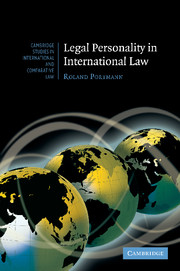Book contents
- Frontmatter
- Contents
- Foreword
- Acknowledgments
- Table of Cases
- List of Abbreviations
- Introduction
- Part I The concept of personality in international law
- Part II The conceptions of personality in international law: their origins and legal manifestations
- Part III A framework for personality in international law
- 10 Appraisal of the conceptions and their assumptions
- 11 An individualistic and formal frame of reference
- Conclusion
- Bibliography
- Index
- Titles in the series
- References
11 - An individualistic and formal frame of reference
Published online by Cambridge University Press: 05 October 2010
- Frontmatter
- Contents
- Foreword
- Acknowledgments
- Table of Cases
- List of Abbreviations
- Introduction
- Part I The concept of personality in international law
- Part II The conceptions of personality in international law: their origins and legal manifestations
- Part III A framework for personality in international law
- 10 Appraisal of the conceptions and their assumptions
- 11 An individualistic and formal frame of reference
- Conclusion
- Bibliography
- Index
- Titles in the series
- References
Summary
A frame of reference for personality in international law must combine principles of the individualistic and the formal conceptions. The two are historically and intellectually closely related and converge in their criticism of traditional views of statehood, the role of individuals, and the sources of law. However, their concrete focus varies. The individualistic conception is almost exclusively concerned with the role of individuals and of fundamental legal principles in international law, thereby neglecting to provide an overall framework for international personality. The formal conception, on the other hand, offers a complete analysis of personality in the international legal order based on a meta-legal basic norm, but fails to take true account of the now accepted category of peremptory principles. A combination of the two conceptions can temper their respective shortcomings. Accordingly, the general approach of the formal conception has to be grounded in fundamental legal principles. These call for special considerations with regard to their personal scope.
Such a framework does not state which entities actually are international persons. This is a matter to be established in the concrete circumstances of a legal issue. What the frame of reference offers are basic principles according to which this task can consistently be fulfilled in a variety of legal situations. Hence, depending on the context, very different entities have international legal status.
- Type
- Chapter
- Information
- Legal Personality in International Law , pp. 271 - 281Publisher: Cambridge University PressPrint publication year: 2010
References
- 1
- Cited by



